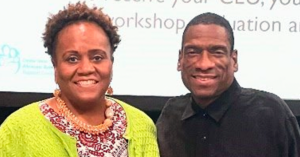
Hogg Foundation director of programs, Vicky Coffee, and keynote speaker, Thabiti Boone, at the 2023 Central Texas African American Family Support Conference
At the 2023 Central Texas African American Family Support Conference keynote speaker Thabiti Boone presented ”Black Manhood and Fatherhood: A Discussion on Mental Health”, sharing his personal journey of growth through mental health challenges.
Boone is one of the nation’s leading voices speaking to the interests of fathers, Black men, and boys. His influence spans the realms of sports, politics, social justice, community empowerment, activism, and advocacy. In his capacity as a representative for the Obama administration’s Fatherhood Mentoring Initiative, he helped spearhead the first ever White House convening on Black men and mental health.
After the conference, Ike Evans, communication manager at the Hogg Foundation, spoke with Boone about his personal and professional experience promoting mental wellness in the Black community.
Content has been edited for length and clarity.
Ike Evans: During the Obama administration, you were named as a representative to the president’s Fatherhood Mentoring Initiative. You characterized a common response from the Black community as ‘Why you?’ Where do you think that response was coming from? And how would the present-day you answer that question, ‘Why you?’
Thabiti Boone: In the Black community, especially in the Black community that’s experiencing distress and lack of success, we ask ‘Why should I celebrate somebody else if I’ve never been exposed to anything that’s good myself?’
We ask, ‘Why you? You got the same life contract that I got: housing projects, poverty, all the pitfalls. What makes you better than me? Why would Obama choose you?’
We also don’t always have the cultural humility to celebrate one another, to feel that ‘your success is also my success.’ We lose that understanding. That’s part of the mental health challenges we face in our communities. We ask, ‘Why you? You’re no better than me,’ as opposed to ‘Why shouldn’t it be you?’
As an adult, I was able to overcome that attitude. Looking back now with a different mindset, now I can say, ‘It should be me.’
IE: You’ve been speaking to these issues for quite a while. Is there anything about your approach to addressing mental health that has changed or evolved over time? Is there anything you find yourself emphasizing more?
TB: Yeah. I make myself more vulnerable by communicating my message through my personal story. I use my story to show my faults, my shortcomings, and to introduce concepts like self-sabotage. Delivering my message through my story also lets me weave in the small victories, the self-confidence, and the constant affirmation of myself and who I am that communicates what I’m able to do.
IE: What do you think is the main stumbling block to people being more open to talking about mental health?
TB: It’s the shame. It’s also the difficulty of emotionally articulating what we’re feeling and what we’re going through. Some of us just can’t sort that out. It takes a lot of work to be emotionally strong enough to tell other people what our mental health challenges and barriers are.
Once we’re able to release those feelings we can begin to process the hope, healing, and happiness that we all deserve.
Related content
- Hogg Foundation Awards 2023 Healthy Minds Grants for African American Mental Health, Well-being
- Austin Area African American Behavioral Health Network
- The Hogg Foundation for Mental Health Declaration of Racism as a Mental Health Crisis
- Into the Fold, Episode 100: Black Lives Matter
- Racial Trauma and Resilience in African American Adults
